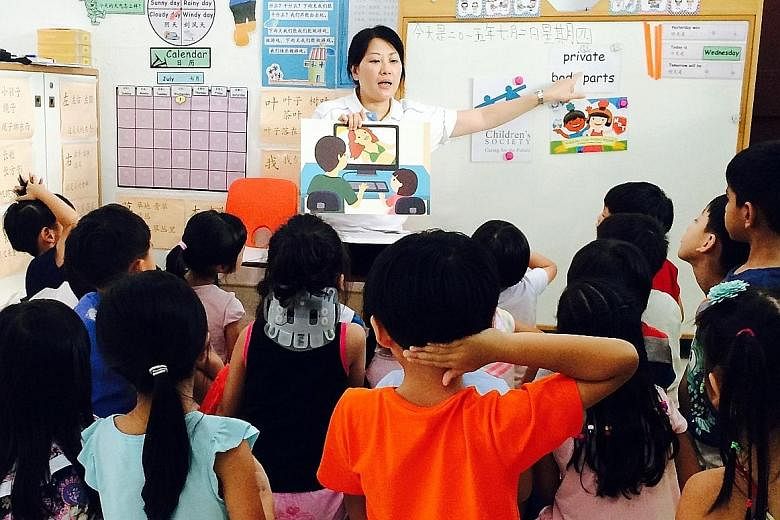It is never too early to start teaching basic sexuality education to young children, say several pre-schools and experts, in the light of a recent incident in which a boy allegedly touched a girl inappropriately.
Most pre-schools contacted by The Straits Times said they teach children which body parts are private and should not be touched by others. Those that do not, think it is too early to be doing so.
The alleged touching incident occurred at a PAP Community Foundation (PCF) Sparkletots Preschool in Taman Jurong on April 12. Both children involved are aged six.
A parent of the girl wrote in a Facebook post that the boy allegedly put his hand under the girl's skirt during an afternoon nap, and admitted to doing so when questioned.
PCF said it is in touch with both children's parents, and is reviewing steps to prevent a recurrence. The Straits Times understands that both children are back in pre- school, but not at the same centre.
After news reports of the case, Singapore Children's Society (SCS) chief executive Alfred Tan wrote to The Straits Times Forum, calling for educators and parents to "step up" in teaching appropriate sexuality education to children.
SCS runs a one-hour programme called KidzLive at pre-schools for free, on request, to teach five- and six-year-olds "body safety skills". It has taught more than 5,000 children from 120 pre-schools since the programme was started in 2011.
Through storytelling and song, children learn how to differentiate between "good and bad touches".
They learn that a good touch makes them feel happy, such as when a teacher pats them on the back for good behaviour, while a bad touch is when someone touches their private parts.
They learn to say No, walk Out, and Tell a trusted adult - known as the NOT rules - if they have been touched inappropriately.
"We felt it'd be good if we could educate the kids directly... We want to empower them to speak up for themselves," Mr Tan said.
Pre-schools said they teach children such body safety skills, usually on a more formal basis from Nursery 2, when the children turn four.
Some pre-school chains, such as Modern Montessori International (MMI) and EtonHouse, teach these through books and dolls, as well as during routine care like showering.
An EtonHouse spokesman said: "When the kids can go to the toilet... teachers would respect the children by knocking on the cubicle door to offer help, if needed.
"The children observe these actions, and the mannerism of respecting one another's privacy is rippled across the school."
MMI and pre-school operator Sheffield Kidsworld said they segregate boys and girls during naps.
A few pre-schools do not teach such skills, as they feel that young children may not understand them.
However, an SCS survey of 250 children last year showed otherwise. They improved greatly in their understanding of body safety skills after attending KidzLive.
They were asked questions about such skills - before KidzLive, and about two weeks after KidzLive. The average pre-KidzLive score was 6.3 out of 13. This improved to a near-perfect score of 11.5 later.
Some parents take it upon themselves to teach their children about good and bad touches. Credit controller Renee Koh, 34, who has two girls aged four and seven, said: "I explained to my girls how their bodies are different from boys'."
But others, like marketing manager Felicia Wang, 35, whose son is four, thought that pre-schoolers may be too young to understand.
Dr Carol Balhetchet, a clinical psychologist and SCS senior director of youth services, said: "From as young as four, children already want to discover their bodies, experiment with, touch and explore their own body parts and the body parts of others. This desire to compare bodies is all quite innocent."
And parents, who know their children most intimately, are in the best position to teach them.
Psychologist Daniel Koh said: "Children grow at different speeds, and it's hard to teach them about the right behaviours before they have at least awareness of body parts. Parents spend the most time with the children and can best monitor how fast they develop."
Banking relationship manager Shirley Lim, 36, has begun teaching her younger son, aged two, basic boundaries about his private areas.
She said: "I decided to start early as he's mischievous and it's better if he has earlier self awareness."

